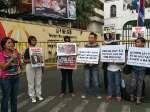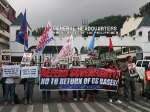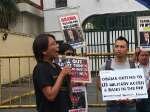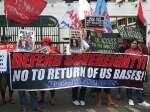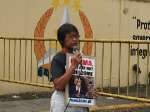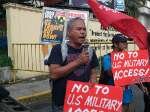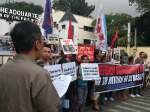By Dr. Carol Pagaduan-Araullo, BAYAN Chairperson
The whole problem with the debate on the fiscal crisis is not so much, as the UP economics students say in their rebuttal of the Bello-Nakpil-Nemenzo paper, the lack of “sound economic reasoning”. The problem is the lack of plain common sense in the analysis and remedies of the Arroyo government, the 11 UP economics professors, Bello-Nakpil-Nemenzo, and the UP economics students themselves.
First, common sense dictates that before you offer solutions, you must first diagnose the problem. The bigger and more chronic the problem is, as in a crisis situation, the deeper one must probe, study and identify the underlying causes and the more radical solutions that are likely required. “Band aid” remedies may cover up and alleviate the condition temporarily, but these will only perpetuate and aggravate the problem in the long run.
Second, all the analyses and “solutions” so far have not squarely addressed the social and political dimensions to the crisis. They conveniently overlook and are silent on the question of social justice, suggesting that the only way to tide over the crisis is by increasing the burden on those who have, over the decades, borne the brunt of hardship and sacrifice.
BAYAN stand
The Bagong Alyansang Makabayan (BAYAN) takes the position that the current fiscal crisis and the impending repeat of a deeper and more devastating financial crisis than the one that hit the country in 1997, is but part of the chronic crisis of the backward, agrarian, pre-industrial economy resulting in a continuing pattern of unequal colonial trade despite the so-called grant of independence in 1946. Further, BAYAN asserts that no fiscal or economic measure can solve the problem without first of all being socially just.
A fundamental feature of the Philippine economy is its inherent inability to earn enough from its exports in order to pay for its imports especially from the US, Japan and the rest of the developed capitalist world. We export raw materials and semi-processed/low value-added goods and import oil, machinery and a wide range of durable and nondurable manufactured goods such as cars, computers, electronic gadgets, food and clothes. This has resulted in chronic balance of trade and current account deficits since earnings from exports could never catch up with expenditures on imports.
Through the decades, exports earnings have begun to shrink faster relative to the increase in the cost of imports, especially with the continuing overproduction of raw materials and semi-processed goods in the world market since the 70s and the 80s. That is why, from the time of the Marcos dictatorship to the present, there has been growing dependence on the remittances of an estimated 8 million overseas Filipinos who plow their earnings back into the economy amounting to more than US$7 billion a year.
With the onset of “globalization’ and the neo-liberal policy prescriptions of trade and investment liberalization, deregulation and privatization, whatever local industries could survive in the stunted economy were further subjected to unfair competition, dumping, cut-price tactics, and government exactions and restrictions until many more folded up. Even the agriculture sector has been ravaged by the removal of protective tariffs and subsidies, with vastly cheaper agricultural imports flooding the market and driving tens of thousands of farmers to bankruptcy.
Since the domestic economy cannot earn enough foreign exchange with this institutionalized unequal trade, the government has resorted to foreign and domestic borrowing.
Attracting foreign investments have become the be-all and end-all especially when cheap foreign loans dried up in the 80s. The belief was, this would set up the factories, create the jobs and generate the social wealth and capital needed to move the entire country forward. But decades of reliance on foreign investments, loans and official development aid have only caused further de-industrialization such that the only “industries” existing today are those in the extractive industries such as mining and those engaged in semiprocessing to produce low value-added commodities, more than 90% of which is made up of imported raw materials.
On top of all this, instead of helping to develop the country, these foreign monopoly capitalists have siphoned off whatever domestic capital there is by sourcing their capital requirements locally instead of bringing in their much-touted investments and then repatriating billions of dollars of profit abroad. Removal of foreign exchange controls in accord with liberalization tenets of the IMF/World Bank and the WTO made the outflow of precious foreign exchange that much easier.
The logical outcome is a vast sea of poverty and misery encompassing the entire country and people. According to census data, 75% or 58 million people are forced to live on P82 a day while 90% eke out a living on P137 or lower per day. According to the recent Asian Development bank report, 12% of Filipinos are in “extreme poverty” and are forced to subsist on $1 (P57) or lower a day.
Fundamentally Unsound
What has been papered over by government, the UP economists, as well as Bello and company , is the fact that the country’s economic fundamentals are not sound. The proof is actually staring us in the face and revealed by a careful perusal of even the UP economics study.
The UP study draws attention to the economy’s heightened vulnerability to “any large external shock” such as a sudden increase in global interest rates, a sustained increase in world oil prices, a sharp decline in overseas workers’ remittances or anything that could cause the import bill to rise, including, ironically, attempts to revive an import-dependent, export-oriented economy.
It points to the fact that “the historical growth rate of the Philippine economy from the 90s to the present averages only slightly more than 4% even if only non-crisis years are included.”
Most damning of all is what the UP economists aptly described as the “deepening crisis” of the deficit and public debt that are merely the exposed portions of the huge and festering problems of the economy: its basic incapacity to produce adequately for the people’s needs because of the reality of feudal ownership of land and the absence of industrialization; its debt addiction and ensuing enslavement to international usury; and its lack of sovereign protection in the face of policy dictates of the IMF/World Bank and the importunings of monopoly capital as a whole.
To utilize a commonsensical analogy, how can the patient be fundamentally healthy if what is diagnosed by the experts as a simple case of colds turns out to be a deadly pneumonia.
Finally, where does social justice enter the picture in all the fine discourse about the current fiscal crisis and how to ride it out?
Even in “normal” non-crisis times, the poor are exploited and oppressed. They who produce society’s wealth have always been the last and the least to enjoy the fruits of their labor. While they have never ceased to ask for what rightfully belongs to them — a just share of society’s wealth — the rich and the powerful have always callously disregarded such a legitimate, not to mention, morally just demand.
Those who are in the lower income brackets of our society — the farmers, workers, rank-and-file employees, vendors, public utility drivers, etc — have long been groaning under the yoke of onerous taxes concealed in ever-rising prices of basic commodities. Like their ancestors under the Spanish and American colonialists, they have been bearing the brunt of sacrifice to buoy over society from one crisis to another. Each crisis leaves them in deeper misery and penury while the social elite not only survive but end up richer and more powerful.
Sadly, the various “solutions” being pushed by government, academics, clerics, civic leaders and whatnot, reflect this utter callousness and insensitivity to the people’s demand for social justice. The UP economics paper warns against solutions that not only have little chance of succeeding, but would likely stir social unrest. But it falls short of requiring that a “solution” must first of all be socially just.


